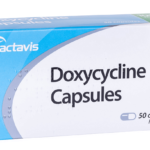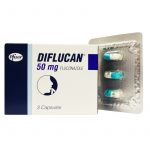How Long Does Doxycycline Stay In Your System?

Doxycycline is a medication used to treat infections caused by bacteria, including pneumonia and other respiratory tract infections; certain infections of the skin or eye; infections of the lymphatic, intestinal, genital, and urinary systems; and certain other infections that are spread by ticks, lice, mites, infected animals, or contaminated food and water. It is also used along with other medications to treat acne. Doxycycline is also used to treat or prevent anthrax (a serious infection that may be spread on purpose as part of a bioterror attack), in people who may have been exposed to anthrax in the air, and to treat plague and tuleramia (serious infections that may be spread on purpose as part of a bioterror attack). It is also used to prevent malaria. Doxycycline can also be used in people who cannot be treated with penicillin to treat certain types of food poisoning.
Doxycycline (Oracea) is used only to treat pimples and bumps caused by rosacea (a skin disease that causes redness, flushing, and pimples on the face). Doxycycline was invented and clinically developed in the early 1960s by Pfizer Inc., New York, NY, and marketed under the brand name Vibramycin. Vibramycin received FDA approval in 1967, becoming Pfizer’s first once-a-day broad-spectrum antibiotic.
How it works
Doxycycline belongs to a class of drugs called tetracyclines. It works to treat infections by preventing the growth and spread of bacteria. It works to treat acne by killing the bacteria that infects pores and decreasing a certain natural oily substance that causes acne. This drug blocks a bacterial protein from being made. It does this by binding to certain units of the protein. This stops the protein from growing and treats your infection. It works to treat rosacea by decreasing the inflammation that causes this condition.
How should Doxycycline be used?
Doxycycline comes as a capsule, delayed-release capsule, tablet, delayed-release tablet, and suspension (liquid) to take by mouth. Doxycycline is usually taken once or twice a day. Drink a full glass of water with each dose. If your stomach becomes upset when you take doxycycline, you may take it with food or milk. However, taking doxycycline with milk or food may decrease the amount of medication absorbed from your stomach. Talk with your doctor or pharmacist about the best way to take doxycycline. Follow the directions on your prescription label carefully, and ask your doctor or pharmacist to explain any part you do not understand. Take doxycycline exactly as directed. Do not take more or less of it or take it more often than prescribed by your doctor.
Swallow the delayed-release tablets and the Acticlate CAP capsules whole; do not split, chew, or crush them.
If you cannot swallow certain delayed-release tablets (Doryx; generics) whole, carefully break up the tablet and sprinkle the contents of the tablet on a spoonful of cold or room temperature (not hot) applesauce. Be careful not to crush or damage any of the pellets while you are breaking up the tablet. Eat the mixture right away and swallow without chewing. If the mixture cannot be eaten right away it should be discarded.
Shake the suspension well before each use to mix the medication evenly.
If you are taking doxycycline for the prevention of malaria, start taking it 1 or 2 days before traveling to an area where there is malaria. Continue taking doxycycline each day you are in the area, and for 4 weeks after leaving the area. You should not take doxycycline for the prevention of malaria for more than 4 months.
Continue to take doxycycline even if you feel well. Take all the medication until you are finished, unless your doctor tells you otherwise.
One doxycycline product may not be able to be substituted for another. Be sure that you receive only the type of doxycycline that was prescribed by your doctor. Ask your pharmacist if you have any questions about the type of doxycycline you were given.
How long does Doxycycline stay in your system?
There are several factors that come into play when estimating how long Doxycycline will stay in your system because every patient has physiology unique to them. Here are some major factors you should consider when trying to understand how long Doxycycline will stay in your body:
• Age: Typically, the younger you are, the more efficient your body functions are. The more efficient your body functions, the faster Doxycycline will be removed from your system.
• Amount: The higher the dose of Doxycycline you have been taking, the longer Doxycycline will take to be removed from your system.
• Genetics: Genes predispose people to different metabolic functions, which is a key factor in how your body processes medications like Doxycycline. For this reason, your genetic makeup comes into play when estimating how long Doxycycline will remain in your system.
• Kidney and liver functions: The liver and kidneys eliminate everything you ingest, and Doxycycline is no exception. If your liver or kidneys are damaged, it will most likely take longer for your body to remove the Doxycycline from your system.
• Metabolism: Your metabolism determines how quickly you process foods, liquids, and drugs such as Doxycycline. If your metabolism is slow, it will take longer for your body to process and eliminate Doxycycline from its system than someone with a fast metabolism.
• Usage frequency: The longer you have been taking Doxycycline, the longer it will remain in your system. For example, it will take longer for someone who has taken Doxycycline for several years to remove Doxycycline from the body than someone who has only been taking Doxycycline for a few months.
Doxycycline is metabolized in the liver and gastrointestinal tract and concentrated in bile Label. Major metabolic pathways of doxycycline have not been identified, however, enzyme inducers have been found to decrease the half-life of doxycycline.
Generally, Doxycycline is almost completely absorbed after oral administration. Peak concentrations are reached within two to three hours after dosing; however, it may take up to 48 hours before infection-related symptoms start to abate. Your acne might start improving within 2 weeks, but it can take up to 12 weeks (or 3 months) to see the full benefit of the treatment. You’ll know doxycycline is working for you when you see less acne forming and your skin starts to look clearer.
Doxycycline has an average half-life of 18-19 hours. The half-life of a drug is the time it takes for the amount of a drug’s active substance in your body to reduce by half. This depends on how the body processes and gets rid of the drug.
Generally, it takes around 5 to 6 half-lives for a drug to be completely eliminated from your system, you can expect to be free of Doxycycline after about 4 days (96 hours) after your last use.
Take doxycycline as directed. Some branded and generic versions of doxycycline need to be taken one hour prior to or two hours after meals. Ensure you know when to take your branded or generic version of doxycycline. Unlike some other tetracyclines, the absorption of doxycycline is not markedly influenced by food or milk.
Ensure you maintain hydration while taking doxycycline. This may help reduce the incidence of gastrointestinal side effects. Avoid excessive sun exposure or artificial ultraviolet light while receiving doxycycline. Seek medical advice if skin redness or skin eruptions develop. Wear sun-protective clothing and use an SPF50+ sunscreen when outside if exposure to sunlight is unavoidable.
Talk to your doctor immediately if you develop watery or bloody stools, which may be associated with stomach cramps or fever, within a few days to months of discontinuing doxycycline. A course of doxycycline may increase the risk of vaginal candidiasis in women. Talk to your doctor or pharmacist about treatments if you develop symptoms of vaginal candidiasis.





